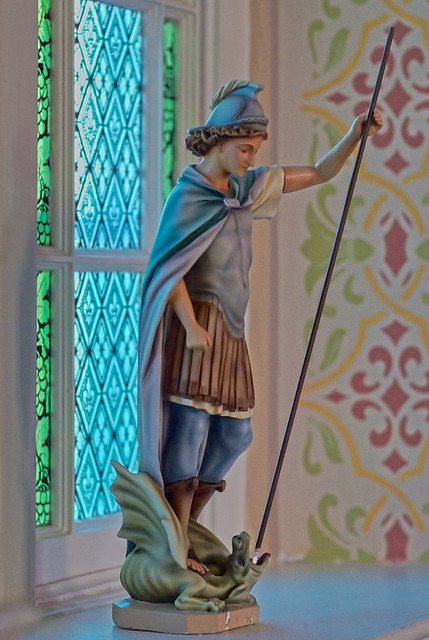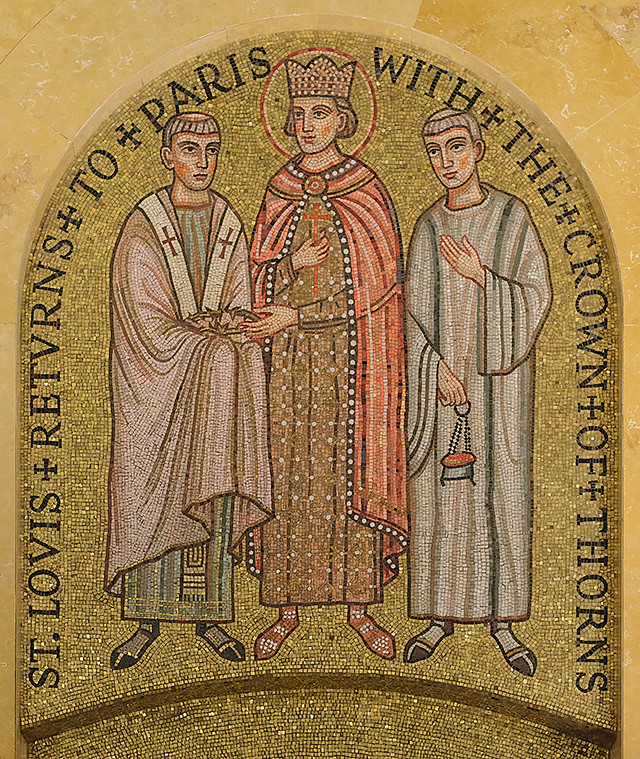
Sancte Michael Archangele, defende nos in proelio. At Saint Martin Church, in Starkenburg, Missouri.


The primary meaning of… [happiness] in all the leading European languages seems to involve the notion of good fortune, good chance, good happening; but from a very early date in the history of Greek philosophy the conception became the centre of keen speculation and dispute. What is happiness? What are its constituents? What are the causes and conditions of happiness? How, if at all, does it differ from pleasure? What are its relations to man's intellect, to his will, to his life as a whole? What is its position in a general theory of the universe? These are questions which have much occupied the various schools of philosophy and, indeed, have exercised men who would not be willingly accused of philosophizing. For happiness is necessarily amongst the most profoundly interesting subjects for all of us…What I am seeking is references to scholarly writings on the subject, from theologians, philosophers, psychologists and others. I am also interested in comparing what Catholic philosophers and theologians think about happiness and comparing them to those of other religions, as well as comparing ancient understandings of happiness with modern thinking.
I RECENTLY POSTED an article, Photos of Mosaics of Saint Louis at the Cathedral Basilica of Saint Louis, but neglected to include photos of the mosaics found at the ends of the nave. I correct this here:



ACCORDING TO an article in the Huffington Post:
Physicists have devised a new experiment to test if the universe is a computer.— from the article Physicists To Test If Universe Is A Computer Simulation, by Michael Rundle.
A philosophical thought experiment has long held that it is more likely than not that we're living inside a machine.
The theory basically goes that any civilisation which could evolve to a 'post-human' stage would almost certainly learn to run simulations on the scale of a universe. And that given the size of reality - billions of worlds, around billions of suns - it is fairly likely that if this is possible, it has already happened.
And if it has? Well, then the statistical likelihood is that we're located somewhere in that chain of simulations within simulations.
…I do think that some of the interpretations of QM are motivated from bad philosophical thinking or ideology.Euclidean geometry, despite all of its complexity, derives ultimately from five simple axioms [later expanded, taking into account some assumptions by Euclid]. The fifth axiom, the parallel postulate, was abandoned by Einstein, and from that he derived the general theory of relativity, which posits that space can be warped. On ordinary scales that we experience, space appears to be absolutely flat and so we can use Euclidean geometry without error. Likewise, some other tweaking of the axioms of geometry ought to give us something that is closer to nature, but on the human scale will resemble Euclid.
However, I believe that one key to digging deeper into the quantum world is to abandon Euclidean geometry as a framework — it is often assumed — but as we know, both space and time are created things, and not absolute.
Renormalization is one unsatisfying way around the infinities generated by Euclidean geometry, but this directly implies that space is quantized; however, grid lattice formulations are just silly, in my opinion.
Clearly, there has to be something that looks like geometry as we approach classical lengths, but has fewer axioms on the quantum scale. Also, there needs to be something in the formulation which does not strongly differentiate 'here' from 'there', in order to derive a simple explanation of confinement and quantum entanglement. Assuming pure geometric locality has gotten physicists into trouble many times. I haven't thought of it much, but there should be similar nonlocal interactions across time. That would be stunning, but shouldn't that naturally come from the theory somehow?
Perhaps a bit of mystical contemplation is needed, for all these theories — and theology — point to an underlying unity…
POPE FRANCIS exhorts:
…There are so many conflicts in this world which cause me great suffering and worry, but in these days my heart is deeply wounded in particular by what is happening in Syria and anguished by the dramatic developments which are looming…That's prayer and fasting, folks.
To this end, brothers and sisters, I have decided to proclaim for the whole Church on 7 September next, the vigil of the birth of Mary, Queen of Peace, a day of fasting and prayer for peace in Syria, the Middle East, and throughout the world, and I also invite each person, including our fellow Christians, followers of other religions and all men of good will, to participate, in whatever way they can, in this initiative.
On 7 September, in Saint Peter’s Square, here, from 19:00 until 24:00, we will gather in prayer and in a spirit of penance, invoking God’s great gift of peace upon the beloved nation of Syria and upon each situation of conflict and violence around the world. Humanity needs to see these gestures of peace and to hear words of hope and peace! I ask all the local churches, in addition to fasting, that they gather to pray for this intention…
[source]